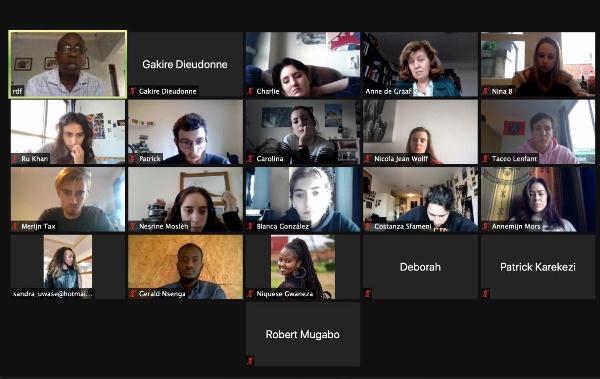
On Thursday morning The National Commission for the Fight against Genocide (CNLG) gave students from the University of Amsterdam an online presentation over Zoom on the history of the 1994 Genocide against the Tutsi, and on the duties of CNLG. The presentation, given by Dr. Jean-Damascène Gasanabo covered the issue of commemoration, prevention, advocacy, documentation, preservation of genocide remains, research as well as efforts that CNLG is responsible for to counter Genocide denial and Genocide ideology.
The presentation began with explaining the commemoration events of the Genocide against the Tutsi such as the annual week of mourning on April 7th- April 13th, as well as all activities during the 100 days of commemoration. He explained the history and the content of the Kigali Genocide Memorial center, the conservation of bodies at the Murambi Genocide Memorial Site in collaboration with the University of Hamburg and the Lower Saxony State Service for Cultural Heritage, Hannover, Germany, and the conservation of textiles at the Nyamata Genocide Memorial Site in collaboration with the University of Pennsylvania, US.
With his expert first had experience, Dr. Gasanabo then explained to the students how CNLG advocates for survivors by listening to them and trying to find solutions to their problems in collaboration with other government stakeholders and the civil society. Dr. Gasanabo then explained to the students how though education at all levels (Primary-to University level) Rwanda hopes to prevent a repeat in history by showing the dangers of ethnic division. Young Rwandans have to know the history of the country especially the planning, the execution of the genocide as well as its consequences. Dr. Gasanabo explained the huge effort associated with organizing and documenting all of the documents from the Gacaca trials. These trials lasted from 2002-2012 and by its end there was an estimated 45 million documents. Dr. Gasanabo explained the process of barcoding and organizing all of these documents into over 20,000 boxes, which were then scanned and stored digitally. However, CNLG is still working on the indexing and connecting the name of the perpetrator with all documents related to him/her.
Lastly, Dr. Gasanabo explained the phenomena of genocide denial and genocide ideology, especially among Rwandans and non-Rwandans living abroad. He explained the strategies they use to denial the genocide against the Tutsi and how to counter the denial especially among the youth.
At the end of this hour-long presentation, students were then offered an opportunity to ask Dr. Gasanabo any questions that they had regarding the 1994 Genocide against the Tutsi or about CNLG and what they do. Questions were mainly related to the righteous and the teaching about genocide in schools.
CNLG and Dr. Gasanabo would like to thank the students of the University of Amsterdam for their attention, and wish them the best in their studies. He also invited the students to visit Rwanda when the covid-19 pandemic will be defeated. (End)
